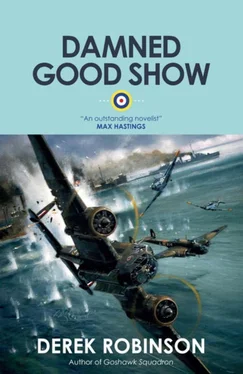“You’re driveling,” Duff said. “Step it out. I’m hungry.”
A CERTAIN HOOLIGAN THRILL
1
Professor Lindemann knew all about Long Delay Pistols and their fickle behavior. When he presented the Butt Report to the Prime Minister and the War Cabinet, he privately awarded the bombshell a Long Delay Pistol of twelve hours before it exploded at Bomber Command HQ.
In fact a full day passed. Even then, the bang was muted: more like the detonation of an underground mine than a bomb-burst on the surface. But the shock-waves traveled all the further. Within a week, most station and squadron commanders had heard of the Butt Report and decided that it was all tosh.
Pug Duff was determined to stamp on it before it leaked to the crews. He called a meeting of the flight commanders and Intelligence Officers, and invited Rafferty too. He asked the adjutant to take notes. Total security was paramount.
“We’ll start with the facts,” Duff said. “This so-called report seems to have been cobbled together by a junior civil servant who’s never flown over Chipping Sodbury in his life, let alone over Wilhelmshaven, and he did it with the doubtful help of a gaggle of Waafs who claim magical powers when shown target photographs. Have I forgotten anything?”
“No, sir,” Bins said. “One thing puzzles me. Nobody disputes the colossal amount of flak that the Hun keeps chucking at our chaps. Would he go to all that trouble and expense if they were nowhere near the target? As has been alleged?”
“He might,” Skull said. “We did, in the Blitz. There were ack-ack batteries all along the South Coast.”
“Stick to the point, man,” Duff said. “What our ack-ack did is neither here nor there.”
“Jerry flak is both here and there,” Hazard said. “My Flight’s got the scars to prove it. So we must be doing something right.”
“Looking at the big picture,” Rafferty said, “I see the Admiralty constantly turning to Bomber Command and asking us to knock out Hitler’s U-boat bases, and the docks at Bremen and so on where they build the U-boats, and the factories that make the diesels. Surely a vote of confidence.”
“Damn right, sir,” Pratten said. “‘B’ Flight has been to Bremen so often we can do the trip blindfold.”
“Given the lousy weather over Germany, that’s usually the best way,” Hazard said. He got a few sympathetic chuckles.
“The group captain mentioned the big picture,” Bins said. “That’s a very valid point. This chap Butt is only one vote. Other experts disagree, and they have hard evidence of damage to targets, reported by other Intelligence sources. Secret agents, neutral businessmen. Photographs never tell the whole story. When the dust has settled, I think we’ll find that Mr. Butt is out-voted.”
Everyone nodded agreement, except Skull.
“You look like a dog that’s about to throw up on the carpet,” Duff said. “Spit it out, for Christ’s sake.”
“I suspect my views are unacceptable, sir,” Skull said. “Rather like some of our target bombing photographs.”
“It’s a free country,” Duff said. “I’m free to ignore your claptrap. Get on.”
“I have three points, sir,” Skull said.
Duff groaned. “Another bloody lecture. Typical university don. Bite him in the ass and he always has three points.”
“Point one: accuracy. One reason the Admiralty makes repeated demands on Bomber Command is our failure to hit the target the first time, or the second, or the third. Point two: target photographs taken over German towns may be obscured by smoke, but when the photograph shows open countryside, we deceive ourselves if we reject such evidence. And thirdly, since you all feel so confident that Butt is utterly wrong, why not let the crews read his report? They know more than we do. Let them judge for themselves.”
“Not bloody likely,” Duff said. “Cross all that out, Uncle.”
“I didn’t record it, sir.”
“Good. For a man with a brain the size of a pumpkin, you don’t think much, do you, Skull? The RAF isn’t a democracy, for God’s sake. Frankly, I don’t give a toss what the crews think, as long as they cart the maximum load of high explosive into Germany.”
“For which, morale matters,” Bins said. Almost an aside.
“Of course! Morale on 409 is damn good! And I’m not about to let anyone bugger it about on the excuse of democracy. If you start talking to the crews about bloody Butt, Skull, I’ll have you in the guardroom lickety-split. Understand?”
For a moment there was no sound but Pug Duff’s breathing and the scratching of the adjutant’s pen.
“I have a question,” Rafferty said, and aimed his pipe at Skull. “If you really believe that our bombing campaign is as faulty as you seem to be suggesting, what is your proposal? How else can this country attack Nazi Germany?”
Skull was silent. Bins screwed the top on the ink bottle.
“Or perhaps we should all just give in,” Rafferty said.
The meeting was over. Everyone except Skull stood and began moving to the door, talking, putting on their caps. “I know one thing,” Skull said. “The truth does not cease to be the truth because men prefer to think otherwise.” If they heard him, they gave no indication of it.
2
Tim Delahaye was, after all, Minister of Information. He had no difficulty in concealing the truth without actually telling any lies. Rollo Blazer, cameraman, died in a tragic accident. He was killed when struck by an aircraft that was taxying at night. What with newsprint being rationed and Rollo not being a famous figure, most newspapers didn’t reckon the story was worth more than an inch at the bottom of page four. Some didn’t think he was worth any space at all. At Crown Films, Harry Frobisher knew the people Rollo had worked with, and he made half a dozen phone calls. “Here’s a man who went all through the Blitz,” he said, “came out of it without a scratch, and would you believe it, a freak accident does what Jerry couldn’t do. Sad loss, very sad. Pass the word, would you?”
The Minister’s limousine took Blake Gunnery, Harry Frobisher and Kate Kelly to the funeral. Delahaye himself sent a wreath, with his apologies: he was speaking in a debate in the Commons that afternoon. Bad timing. The limousine was more than a gesture: Rollo was to be buried in Suffolk, in the village churchyard at Coney Garth. It was Miriam’s idea. She was next of kin. Rollo had no close relatives, and since he was already in the station mortuary, it seemed pointless to bring him back to London.
Rafferty took no chances when he heard that Air Commodore Russell, the big white chief of Press and PR at Air Ministry, would be there. All off-duty aircrew were at the service, with the crew of D-Dog in the front pew. Any other officer who could be spared from his duties was there. Service police provided the pall-bearers. The Officers’ Mess paid the fees for the organist, the choir and the minister. Kate sat next to Rafferty and watched the unhurried, unsentimental ceremony and thought what a pity it was Rollo couldn’t be there to film it. He was a far greater center of attention dead than he had ever been alive.
Afterward, there were drinks in the Mess. Air Commodore Russell took Group Captain Rafferty aside. “Congratulations on your turn out, Tiny. This filming has put you to a lot of trouble, hasn’t it? Sometimes I wonder why we’re bombing Germany. Is it to make the civilians feel better?”
“Morale is a big part of the war effort, Charlie.”
“Yes. Blazer wasn’t the only casualty that night, though, was he? You lost a Wimpy over Hanover, didn’t you?”
“P-Peter. Sprog crew. Only their second op. It’s often that way.”
Читать дальше












